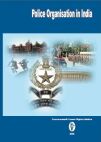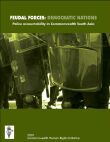
| Home |
| About us |
Programmes
|
| CHOGM Reports |
| What's New |
| CHRI in the News |
| CHRI Events |
| Publications |
| Job Opportunities |
| Contact us |
| Links |
| Site Map |
| Feedback |
| Police
Reforms
EMINENT CITIZENS CALL FOR POLICE REFORM The events that recently transpired in Mumbai were horrific and tragic. As the Prime Minister pointed out in his speech to the nation on November 27, police reforms need to be undertaken if we are to effectively address threats to national integrity. It must be recognized that reforming our police so that they are a professionalized service that is not misused for partisan purposes is central to ensuring basic security and combating terror. Doing so will ensure that protecting all Indians is the first priority of law enforcement and the foundation for good governance. Although such reforms have been discussed for years without much progress, we urge all politicians in the aftermath of Mumbai to finally acknowledge that police reforms are too important to neglect and too urgent to delay. Indians are very angry. They are angry that there are people in this world that wish to harm innocent persons with their mindless violence. They are angry that those tasked with protecting them have failed miserably in that effort. And they are angry that politicians of all parties have wilfully allowed policing to deteriorate to a point where it cannot provide citizens protection in ordinary circumstances let alone in emergencies. Fighting terrorism and other crime is not possible on the basis of a foundationally weak and compromised police service that is used as a private handmaiden rather than as a truly independent public service. The present situation stems from three major factors:
Reforming the police swiftly is entirely possible. Clear and practical recommendations, valid even today, were made by the National Police Commission in 1979. Subsequent committees, and most recently the Soli Sorabjee Committee, have repeatedly endorsed these recommendations. And in 2006 the Supreme Court of India issued seven clear time-bound directions to the Centre and State governments to set in place mechanisms that will address the aforementioned infirmities of policing. Unfortunately, neither the Centre nor the States have complied with these directions and indeed most governments have subverted, diluted or disobeyed them. The directions policing should take in the future - of being a service in support of the law rather than a coercive force shoring up political patrons currently in power - are clear. The people demand that the situation be remedied at the earliest. We therefore urge that:
Adherence to these suggestions will ensure that the police are more responsive and better prepared to deal with security threats and that they are allowed and compelled to do their job professionally. The people of India can afford no less since the price of inaction is far too high. STATEMENT ENDORSED BY THE COMMONWEALTH HUMAN RIGHTS INITIATIVE (New Delhi) AND:
Anyone wishing to join the campaign for comprehensive police reform please contact the Commonwealth Human Rights Initiative at info@humanrightsinitiative.org POLICE
REFORMS ARE CRITICAL TO KEEP INDIANS SAFE Police reforms are too important to neglect and too urgent to delay, was the conclusion reached at a meeting held today. Co-sponsored by the Commonwealth Human Rights Initiative (CHRI) and the India International Centre, participants pressed home the urgent need for comprehensive police reforms so tragically highlighted by the recent attacks in Mumbai. Discussing, “Citizens for Police Reform: A Basis for National Security and Good Governance”, experts explained what kind of police reform is consistent with our Constitution and how such reforms could transform present policing into an efficient and professionalized service. The discussion was part of CHRI’s ongoing campaign for an accountable, adequately resourced, and people friendly police service that is free from illegitimate political interference and answerable only to the law. Chaired by B.G. Verghese, the panel of speakers included former Chief Justice J.S. Verma, former National Security Guard DG Ved Marwah, and former Attorney-General Soli Sorabjee. Mr. Verma was adamant that the time for discussing reforms had long passed; rather, the focus should be on practically implementing the necessary changes that will ensure better delivery of policing services. Similarly, Mr. Marwah was disappointed that notwithstanding the repeated recommendations from various committees, it appears that the requisite political will is absent to enact the necessary changes. Finally, Mr. Sorabjee was adamant that the greatest effort should be focused on resolving the issue of political interference. “The two most important Supreme Court directives involve giving the DG of police two-year tenure and setting up a Police Establishment Board. If the Supreme Court is not respected in this regard, contempt proceedings should be initiated”. All speakers agreed that it is imperative for the Monitoring Committee, set up by the Supreme Court to report on states’ compliance with its directives, to more aggressively pursue its mandate to hold states and the Central government accountable for their inaction. The panellists at the event are 4 of the 40 eminent citizens that signed an open letter last week addressed to all Indian politicians. The letter, signed by notable people such as former Prime Minister I.K. Gujral, former DG of Police Kiran Bedi and former Foreign Secretary Lalit Mansingh, demands that:
Reforming the police swiftly is entirely possible. Clear and practical recommendations, valid even today, have been made by the National Police Commission in 1979 and subsequently endorsed and elaborated by various committees, and including most recently the Soli Sorabjee Committee. In 2006 the Supreme Court issued seven clear time-bound directions to the Centre and State governments to set in place mechanisms that will address the infirmities of today’s policing. Unfortunately, neither the Centre nor the States have complied with these directions and indeed most governments have subverted, diluted or disobeyed them. CHRI maintains that, with or without elaborate legislation, immediate steps can be taken by both the political and police leadership to ensure that the police are better equipped, trained and managed than at present. Maja Daruwala, Director of CHRI, believes that accountability of police to law is a paramount need. “It is important that policing not be autonomous without accountability. While we accept that politicians have ultimate executive control over the police, it is critical that such control is not wielded arbitrarily. Unfortunately, as it stands in India, executive control of the police is only capricious and arbitrary.”
Issues Paper on the National Investigation Agency Act 2008 More information will come soon....... |
|
||||||||||||
|
copyright © Commonwealth Human
Rights Initiative
Site best viewed in 800x600 resolution with IE 5.X & above, Medium Text size. |
|||||||||||||







